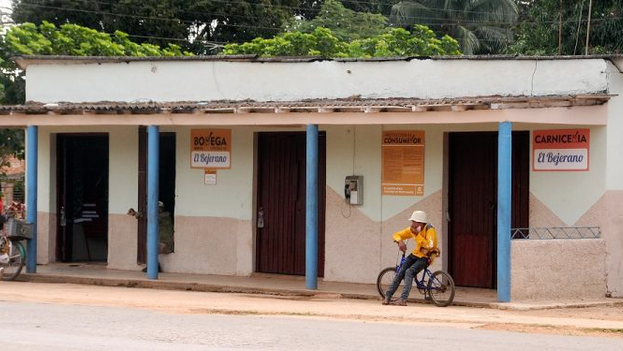
14ymedio, Natalia López Moya, Havana, 1 February 2023 — “Before, here people could use lard to cook, but there is almost no one who raises animals and to make matters worse, since last year they have not sold oil through the bodega [ration store],” complains Liubis Torriente, 32, a resident of the municipality of Alquízar, in the province of Artemisa. “Nor has sugar or rationed coffee arrived, we are about to have to eat red earth.”
In the Liubis bodega, nestled in the center of the small city to the southwest of the Cuban capital, the employee spends her days sitting idly by waiting for the products that do not arrive. “I’m tired of everyone coming and venting their discomfort on me because no merchandise has arrived, but it’s not my fault,” the woman told 14ymedio, on condition of anonymity.
“Here they have forgotten us, we do not have the importance of Havana and nor do we have the emergencies of those affected by hurricane [Ian] in Pinar del Río, so we are in no man’s land, we do not matter,” says Liubis. “My sister lives in Havana, in the Plaza de la Revolución municipality, near the Council of State, and they did sell sugar there,” she says.
The shortage situation fundamentally affects those who live in the urban areas of Alquízar. “At least the farmer who has a piece of land can solve some food with his crops, his laying hens or his cows, but those of us who have a house here in the town don’t even have that,” says this mother of two children at primary school.
And the three missing products can hardly be produced for self-consumption. “We stocked up on the fat we needed for day-to-day life with the pigs we had, but more than three years ago I stopped farming because we couldn’t get food for the animals anymore,” explains Arturo, a farmer who lives in the town of Pulido, on the outskirts of the urban center.
“Without the pork fat, we are completely dependent on the oil from the bodega or the one we buy off the shelf [in the informal market].” Arturo’s family has been eating “plantain fufú” — fried mashed plaintain — for weeks, he says. “There isn’t even enough fat to fry a little onion and what my wife has done is put the chicken skin in the pan so she can cook with it.”
The vegetable oil that is sold by as a part of the ‘standard basket’ in the ration store is mostly imported or soybean oil, which is refined and bottled on the Island. The rationed coffee and sugar come from national production, which is mostly state-owned, and the marketing of both products constitutes an official monopoly.
“When there is a lack of sugar or coffee, you have to deal one way or another with the black market or with the stores [that only take payment] in MLC [freely convertible currency]”, emphasizes Arturo. “You can use some honey to sweeten, and stretch the coffee by adding roasted peas, but sooner or later you have to end up buying them in hard currency.”
“Before, any house you entered here they would offer you a little cup of Hola coffee, the kind that comes from the bodega. If you were lucky, you would have a Cubita or Arriero colada bought in the mall, but now when people manage to have coffee it’s Bustelo or La Llave that their Miami family sent themor they bought it from a mule, very expensive, by the way.”
The lack of sugar especially outrages the residents of Alquízar, a region that in the past also made cash with typical sweets such as guava bars that were sold on the side of the roads. Now, in the absence of the ingredient, all the private production of sweets, fruit smoothies and preserves has come to a standstill.
According to Leticia Ojeda, commercial director of the Food Group of the Ministry of Internal Commerce, at the end of last year, with the plummeting of the harvest, it was decided to protect the “regulated [rationed] family basket” and social consumption destined for the Education and Health sectors, but the Alquizareñas wineries do not seem to be included among those prioritized.
In mid-January, Ojeda pointed out that four provinces had not been able to finish the distribution in some of their municipalities. He mentioned Artemisa, Matanzas, Pinar del Río and Havana, whose sugar deliveries in February were only 60% guaranteed, up until then. An announcement that makes the residents of Alquízar fear that it will be weeks before the empty bodegas have those products again.
____________
COLLABORATE WITH OUR WORK: The 14ymedio team is committed to practicing serious journalism that reflects Cuba’s reality in all its depth. Thank you for joining us on this long journey. We invite you to continue supporting us by becoming a member of 14ymedio now. Together we can continue transforming journalism in Cuba.
